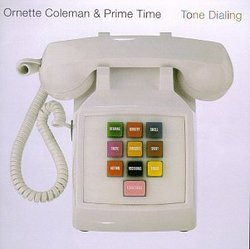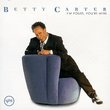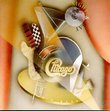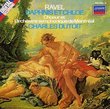| All Artists: Ornette Coleman, Prime Time Title: Tone Dialing Members Wishing: 2 Total Copies: 0 Label: Polygram Records Original Release Date: 9/26/1995 Release Date: 9/26/1995 Genres: Jazz, Pop, R&B Styles: Avant Garde & Free Jazz, Funk Number of Discs: 1 SwapaCD Credits: 1 UPC: 731452748324 |
Search - Ornette Coleman, Prime Time :: Tone Dialing
 | Ornette Coleman, Prime Time Tone Dialing Genres: Jazz, Pop, R&B
|
Larger Image |
CD DetailsSimilarly Requested CDs
|
CD ReviewsFive years later, still a breath of fresh wind waex | the middle of nowhere | 10/30/2000 (5 out of 5 stars) "In order to save a dying art form you have to break new ground in the genera. Enter "Tone Dialing", THE most original jazz album of the 90's. This album strengthened my belief that free jazz is the most variable, individual jazz out there, and this album is the next ticket into that unconquered sonic wild. The disc starts out with "street blues", which is laced with hip hop, the rhythm section and the sax interacting in an almost stream-of-consciousness feel. What "Street Blues" foreshadows, "Search for Life" run's with. This is very close to an actual hip hop song, complete with rhymes, along with lots of the band's improv. "Bach Prelude" is the strangest Bach-jazz piece I have heard, chock full of polyrythms. Now we get to "Sound Is Everywhere", a surreal dream of a piece perfect for late at night when you're half asleep. Although far different that the atonality of Webern, it captures the same general mood. You get the feeling upon listening, that the unconscious is so close to the surface you can see it's periscope. "Miguel's Fortune" sounds almost like a Jazz-Cuban grateful dead jam. The next few songs definitely have a Cuban feel. ""If I Knew" is an (not exactly atonal) atonal ballad (not exactly a ballad) that almost gave me an orgasm the first listen. The whole album has a mood of quiet lucidity. One of Ornettes best, and the only one like it because Coleman rarely repeats himself. The rest of the album is just as groundbreaking, but running short of space. . ." The new forms of harmelodics. Dan | 04/26/2000 (5 out of 5 stars) "I don't think any artist has accomplished so many great breakthroughs in one album as Ornette Coleman as in Tone Dialing. The album consists of 18 tracks ranging from about 3 to 10 minutes each, and from the harmelodic interpretation of Bach's prelude to the integration of Ornette's own styling of rhythmic vitality along with the flavor of hip hop, Afro-Cuban, and many unclassified genres that cannot be defined by any musical subcultures except Ornette's own. As for the performance of these unique musical concepts, I don't think Prime Time has ever been in better shape than it is now at the release of this album. This is my absolute favorite of all the Prime Time albums (that I own). It's difficult to say what tradition this album is in, or what album I'd compare it to, since Ornette Coleman is in the habit of breaking tradition, and experiments with bold, original forms as often as possible (this being not one, but many of them), but I'd recommend it to anyone who like any of (but not limited to)0 the following albums by Ornette Coleman: Science Fiction, Song X, Free Jazz, In All Languages, or The Art of Improvisers.If you've never heard any harmelodic or free Jazz before, this *might* not be the one to start with. I'd suggest Science Fiction first, and moving on from there at your own discretion." Adventurous but melodic a.b. | AWOL | 02/18/2000 (4 out of 5 stars) "Ornette Coleman is one of the musical geniuses of the past 50 years, certainly. And his use of electronic instruments in his Prime Time band is downright wicked on this daring -- and extremely melodic -- CD. The band, with two or three guitarists, electric bass, piano and synthesizers, drums plus programmed electronic drums, and percussion, rages through Ornette's joyful (but at times palpably melancholy) themes and ferociously intense improvisations. This music, with lots of contemporary studio polish, could almost be great background music if not for the way the changing meters and constant modulations make the listener feel like the surface of the music is constantly collapsing on itself! Serious Ornetteophiles and the curious bystander will find something in this music to hang on to. One last note about Prime Time: with the electronics and funky rhythms, Ornette's ideas are even more intense and inexhaustable; unlike many jazz-pop artists he adapts his vision without losing the edgy quality of his acoustic work. The proof is here."
|

 Track Listings (16) - Disc #1
Track Listings (16) - Disc #1








